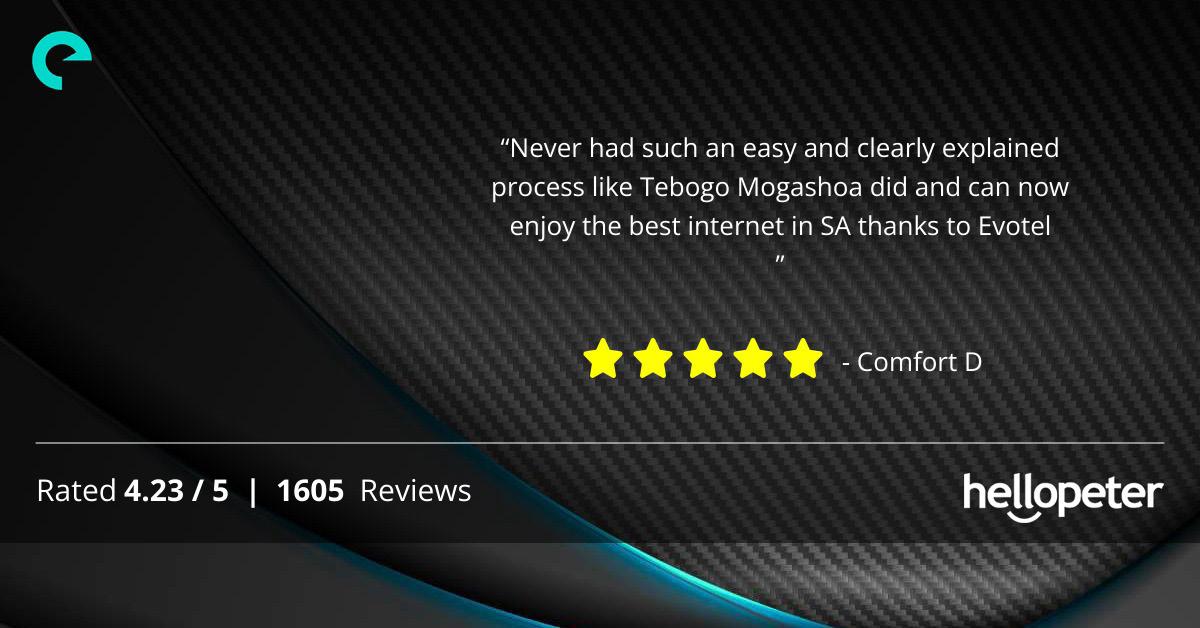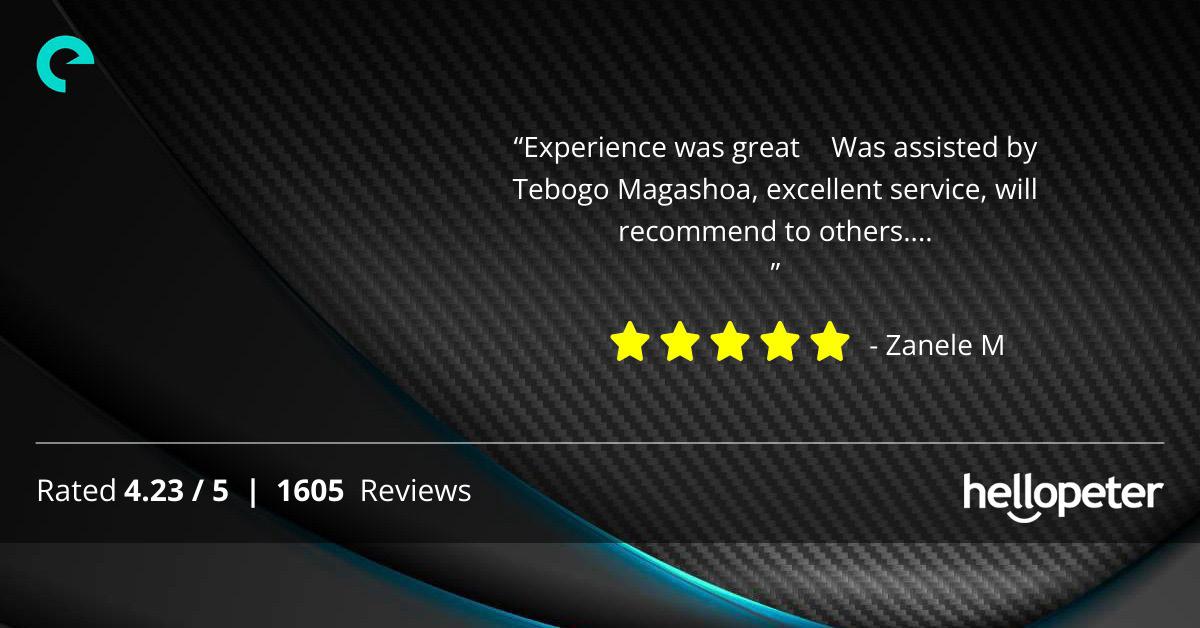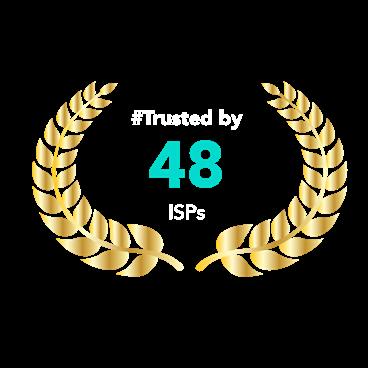

An Evotel Production
Government launches new programme!
New broadband and digital skills programme launched.

Lending a hand in Ennerdale
We talk to community leader and local lady, Levona, about the community.



An Evotel Production
Government launches new programme!
New broadband and digital skills programme launched.

Lending a hand in Ennerdale
We talk to community leader and local lady, Levona, about the community.

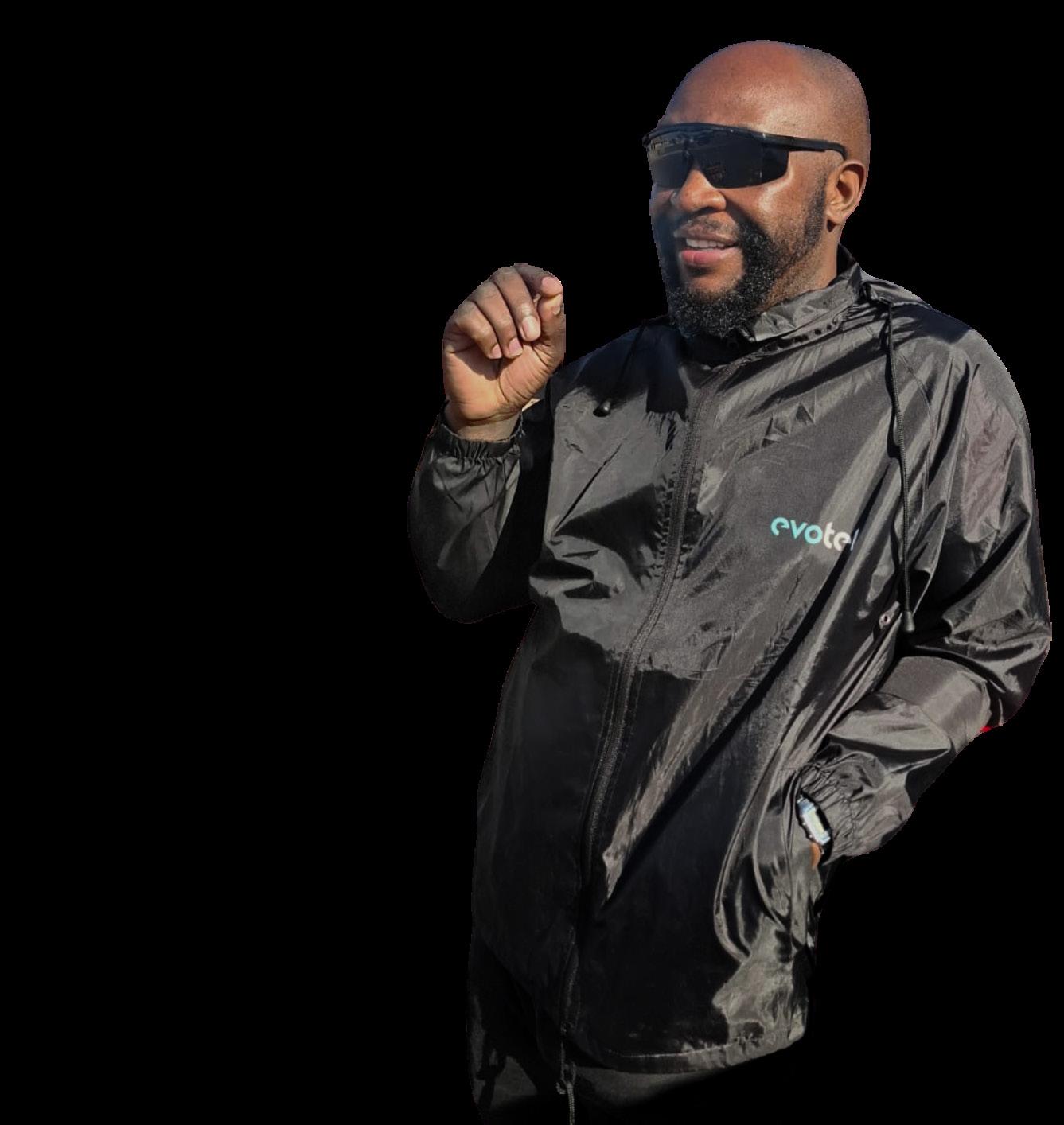


I spent the better part of August revisiting schools that are beneficiaries of our free internet service, and I encountered various scenarios—many encouraging, while others reminded us that there’s still work to be done.
It was a busy tour across the country, and I must express my gratitude to all the school principals and staff who welcomed us with open arms, even when we popped in unannounced or without prior arrangements.
This is the nature of the industry we work in!
The time spent with principals, IT technicians, teachers, learners, and parents was productive, and I must say it was a valuable exercise that will continue into this month.
We currently have many schools connected to our free internet service. Of course, it’s not free—it’s funded by us for a good cause, and the schools are aware of this, which makes it even more special.
However, we’ve realised there’s still a lot of work ahead in transforming South Africa’s digital landscape, but at least we’re on the right path.
With the schools now enjoying free internet, they can redirect funds they would have used for internet costs to cover other important needs.
I can confidently report that all the schools we visited agreed that the Evotel connection is second to none in South Africa— can I get an AMEN to that!
Look, we’re not here for PR. You can visit the schools yourself, have a private conversation with the heads of those institutions, and they’ll confirm what I’m sharing today.
While many schools in urban or suburban areas are benefitting, it’s my special request that schools help us out with smaller items, like network extenders, and make things easier when it comes to branding. This is a simple request, and I’m pleased to say that we’re on the same page with school governing bodies (SGBs).
A quick example: if you’ve installed a borehole at your home, you’re required by law to indicate that the water comes from underground, according to City By-Laws.
Similarly, if you’re off the government electricity grid and using solar energy, it’s advised to label your DB box to indicate you’re using solar power.
Now, if you’re looking for us, just take a walk around the school grounds, and you’ll find our signage indicating that we’re supporting the school. This is why we don’t refer to it as a CSI project, but rather as our commitment to connecting the future.
In this edition, we have a story about educating schools on the power of the internet and why it’s essential for schools to be connected.
There have been many questions, and this article answers everything you might want to know.
We also participated in the broadband launch event led by Minister of Communications and Digital Technologies, Solly Malatsi, earlier this September.
Lastly, after listening to Parliamentary Portfolio Committee Chairperson for Basic Education, Joy Maimela, on SABC’s Morning Live, I became concerned about the declining interest among South African schools in introducing Information and Communication Technologies (ICT).
She pointed out that many schools are discouraged by the lack of facilities and skilled teachers needed to implement Robotics and Coding in the new school curriculum.
I’d be happy to meet with the chairperson to discuss this further and explore how we can assist, or work together to upskill teachers.



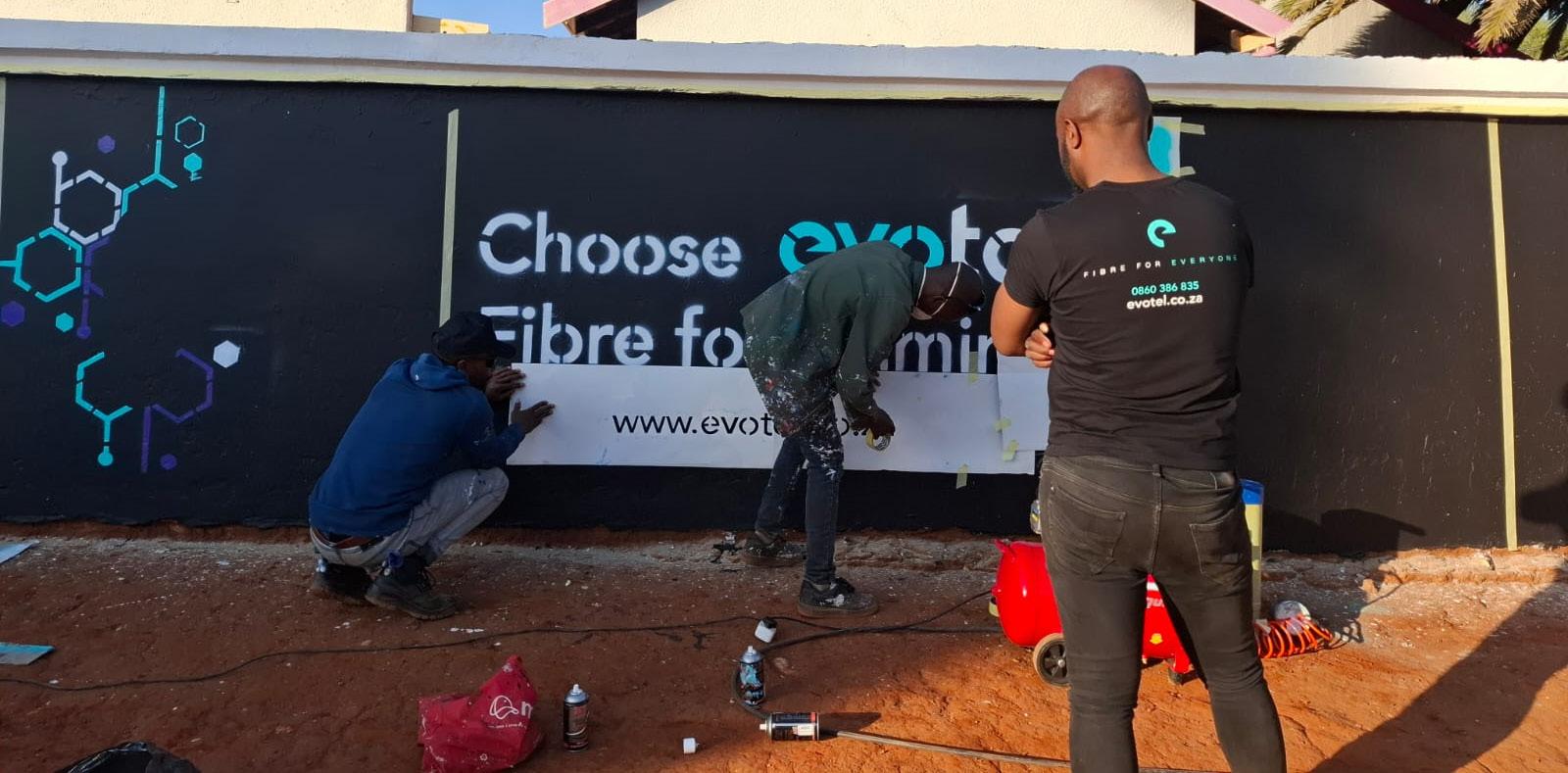
Jonkoro’s JMedia paints Evotel’s SMME programme with golden colours
From a township boy to the owner of one of the fastest-growing outdoor media advertising companies!
At 35, little did he know his success would come so fast that he’d be on track to compete with some of the biggest outdoor media companies.
This is the power that Evotel has bestowed upon Nelson Jonkoro through its Small, Medium, and Micro Enterprises (SMME) programme, where he was empowered to transition from employee to partner.
Evotel is committed to empowering South Africans, and Jonkoro is one of its success stories. His achievements in the highly competitive media industry are used as a benchmark for what can be expected from the Fibre Network Operator (FNO) in the coming years.
Having started at Evotel in March 2022 as an Outdoor Media Coordinator, Jonkoro catapulted himself to the role of Outdoor Media Specialist following a promotion that would change his life forever.
The new role took Jonkoro across the country, arranging media placements, ensuring compliance with by-laws, and co-ordinating locally sourced labour to help expand the media efforts. He faced extreme pressure in complex environments, but he rose to the challenge like a duck to water.
4
In a nutshell, Jonkoro, who already owned a registered company called JMedia, made sure Evotel’s brand visibility was everywhere for all to see.
Using billboards, wall murals, street pole adverts, and many other advertising techniques, he helped establish the company’s name in its coverage areas.
“It came with a lot of responsibilities, including engagements with officials and municipalities to protect the company from possible lawsuits, plagiarism issues, and managing a team of local workers to complete the work,” says Nelson.
According to the cucumber-cool gentleman, it all starts with a site inspection at a location identified for marketing or where Evotel plans to roll out its fibre. He would then interact with the local municipality, ensuring compliance with by-laws, and thereafter he would find opportunities that best aligned with the company’s objectives.
From there, he would identify the perfect spots where potential clients could be exposed to the adverts en masse.
Within residential areas, he would pinpoint walls on private property and negotiate with the owners for potential branding opportunities to create advertising artwork, all in the name of Evotel.


He did all this with excellence until the company chose to promote him further by offering him a completely different contract through his JMedia company. By late 2023, Jonkoro had transitioned from full-time Evotel employee to Evotel partner.
“I am now offering services to Evotel as a partner,” he explained, indicating that Evotel now outsources from him.
“At first, I wondered if I could do this on my own. But the company didn’t throw me under the bus; I received a lot of guidance and support. I already knew the job, but I wanted to impress. First things first, it’s critical to have good relationships with municipalities and understand their by-laws because any transgressions could result in heavy fines for the company.

“You know, I really fell in love with this job. Thanks to Evotel, JMedia is now growing faster than ever, and I see a brighter future for myself as a business owner and employer. I always aspired to run my own business, and now it’s happening.”
Coming from a broadcasting background, having worked at SABC’s Lesedi FM as a show producer, Jonkoro says this is where he mastered the art of advertising and its importance to any company.

As a graduate of Evotel’s black empowerment SMME programme, Jonkoro says he is now passionate about promoting more township businesses, a task he enjoys as he helps others grow in their craft.
“I’m upskilling others to be like me,” he said, further explaining that JMedia has trained township artists across the length and breadth of Evotel’s coverage areas.
“From learner to teacher, that’s me today. We have murals all over the place now, done by us as JMedia.”
He said he is emotional when he realises how far he has come and how the company continues to support him in his future endeavours. “The company trusted me with their brand, and I’m very grateful. Evotel’s black empowerment policy is real, not just lip service.”
Evotel’s Head of Marketing, Richard Genlloud, said the company has always had a policy of working with communities, “and it helps that we share wealth with them.”
“Nelson is one of our success stories, and we aim to create many more with similar stories to tell. He worked with Evotel before starting his own business, and we supported him in his venture. Now he’s using his skills to upskill other South Africans and has secured work from other upcoming brands,” said Genlloud.
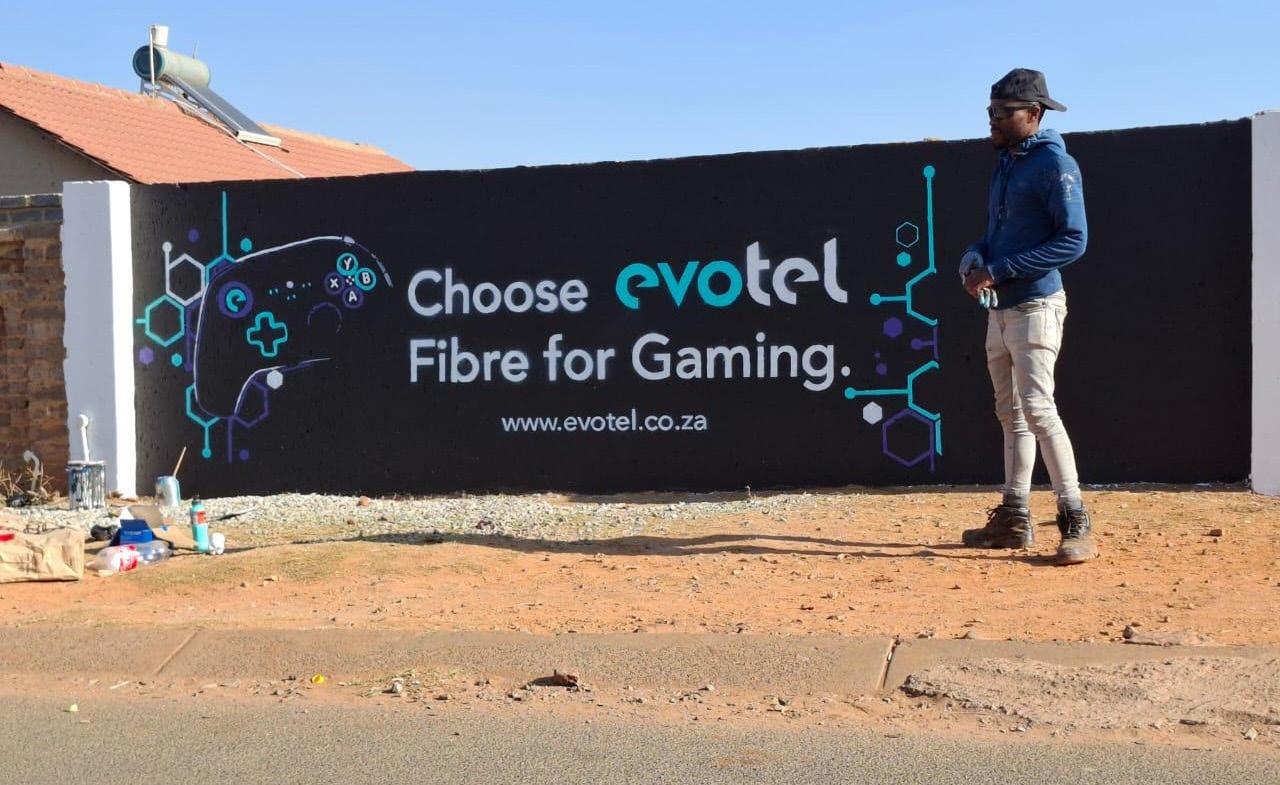
Evotel’s network continues to dominate in Rustenburg, Krugersdorp, Vryheid, Newcastle, and Ladysmith, where the majority of schools visited by the Fibre Network Operator (FNO) have given their uncapped, unshaped, and unrestricted internet connection a thumbs up.
The warm welcome from school administrators in cities rich with history was a clear indication that Evotel is successfully navigating its open-access fibre networks, with visible signs of progress, guided by the evident satisfaction in these areas.
Evotel could very well be considered an industry leader in schools’ corporate investment. Currently, nearly 100 institutions benefit from their free 1Gb internet access.
Their generosity is a testament to how lives are being transformed in these challenging times when schools must have stable internet access.
Areas benefiting from free internet include Northriding, Krugersdorp, Lenasia North and South, Ennerdale, Randfontein, Middelburg, Witbank, Virginia, Welkom, Rustenburg, Ladysmith, Newcastle, and Odendaalsrus among others.
It has been proven that initiatives like these significantly enhance education, enriching both learners and educators with lessons and a deeper understanding of the future.
According to Evotel’s management, the free connection won’t stop here; it will continue until all schools are digitised.
The profound change brought about by this reliable free internet in schools cannot be overstated, as it opens up a world of educational resources and opportunities. This has been demonstrated by learners at Limit Hill Combined School in Ladysmith.
Gerard Fynn, the school’s administrator, recently shared that everyone at the school is thrilled with the generous contribution Evotel has made to their lives.
“We’re thrilled and grateful, as are the staff, students, and the principal, for your interest in our progress with coding and robotics,” he wrote.
Meanwhile, in Rustenburg, Laerskool Protea Park principal, Henk Pieterse, expressed their pride in being one of the beneficiaries of Evotel’s service.
“All learners in our 60 classes, from Grade R to 7, have had a taste of the Evotel network. Even our class for learners with special needs is benefiting from Evotel’s support.
“There’s also something unique at our school— our music classes. They rely entirely on internet access, using beats from YouTube and downloading resources from our free sites,” Pieterse said while showing us around the school’s infrastructure and explaining the reasons for recent renovations.
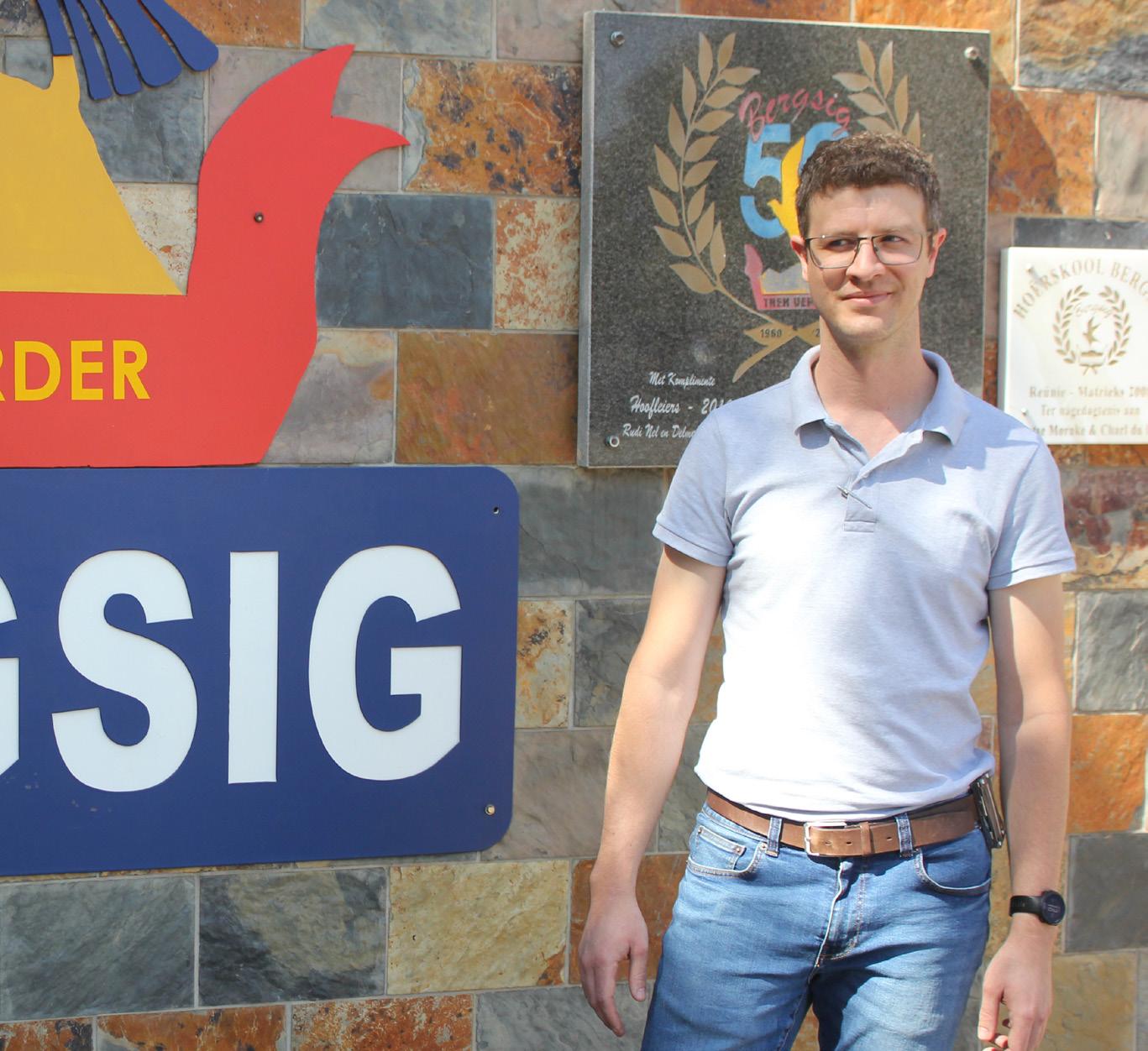
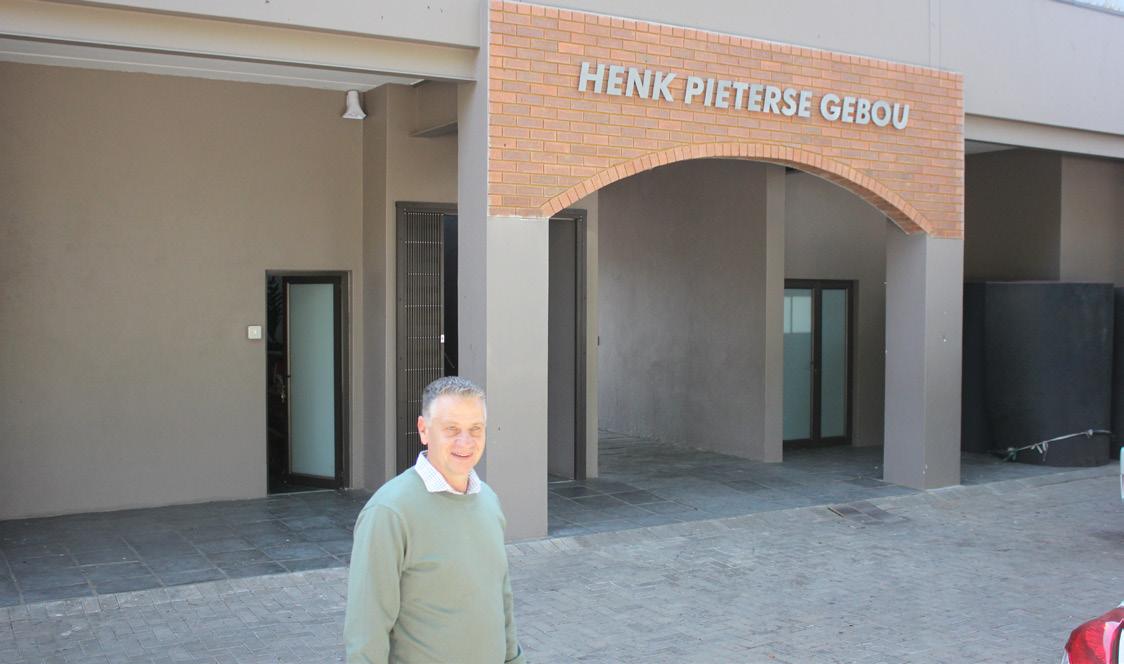
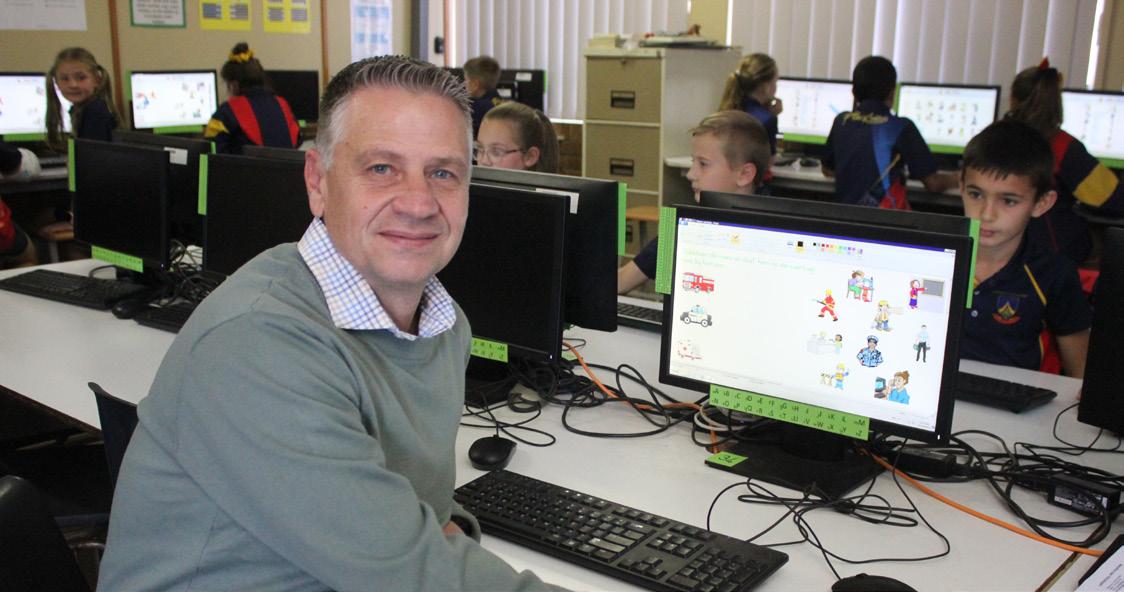

Pieterse admitted that they had to switch to Evotel after being let down by their previous service provider: “Their LTE network was inconsistent, and we were relieved when Evotel came on board with fibre internet.
Our telephone lines rely entirely on the internet, so consistency and reliability are crucial. Our computer labs are in use throughout the day, and our teachers now use smart TVs, which require internet. We’re phasing out smartboards because the TVs are far more effective.”
Following their connection to Evotel, Laerskool Protea Park took the initiative to extend the network to all classrooms, significantly improving the quality of teaching and learning.
Now, a teacher can come to class, connect their laptop to the internet or hotspot, and it automatically syncs with the Smart TV, replacing the old chalkboards. Learners use tablets that connect to the teacher’s software, making notetaking and learning far easier than it was a decade ago.
Depending on the subject, learners move on to the computer lab, where they work hands-on with the curriculum, sitting at keyboards and screens connected to the Evotel network.
Just a stone’s throw from Laerskool Protea Park, in the North West, Hoërskool Bersig’s administrator, Jacques Strydom, praised the connectivity speed.
“We’re currently in Matric preliminary exams, and most of our learners are browsing past papers, made possible by the power of the internet. We’ll have virtual exams, which will rely on a stable connection to prevent cheating,” Strydom emphasised.
Strydom also mentioned their goal of turning the school into a technologically advanced institution, where everything is linked to the internet, supported by the high-speed broadband that powers their five computer labs.
They offer free, limited internet to learners for research, especially for electronic lessons taught during the day.
Elsewhere in KwaZulu-Natal, parents in Vryheid are speaking on behalf of schools like Lucas Meyer Primary School.
Rose Viljoen, a parent of two learners at Lucas Meyer, said: “Life has become so much easier. We used to have to buy LTE routers for our children and make sure they had data for schoolwork, but that’s a thing of the past now, thanks to the free internet at the school.
“Can you imagine how much we save during these tough times, with the economy at its lowest? It’s unparalleled. The children are enjoying school so much more because of the excellent infrastructure.”


In a world where public representatives, particularly councillors, are inundated with endless service delivery queries and must make numerous critical decisions daily, having the necessary digital skills will enable them to work smarter, resolve public issues faster, and be more accessible to residents.
The Department of Communications and Digital Technologies, responsible for all telecommunications, is determined to unlock infrastructure development and roll out broadband networks in municipalities, aiming to boost local businesses with digital capabilities to improve their competitiveness in both local and global markets.
According to a statement from the department, this will help create job opportunities in the telecommunications and related industries, as well as improve access to education through reliable online learning and innovation.
Minister of Communications and Digital Technologies, Solly Malatsi, launched the Broadband and Digital Skills Programme—a joint initiative between his department, the SA Local Government Association (SALGA), and the British High Commission.
Speaking in Polokwane, Limpopo, on 3 September 2024, Malatsi explained that the programme aims to empower municipal managers and councillors to oversee the deployment of broadband infrastructure inclusively, ensuring it reaches as many people as possible.
“Especially those who are digitally disconnected from the rest of the world or have been left behind by many current digital advances,” he said, with nods of approval from the British High Commissioner, Anthony Phillipson. The programme’s goal is to equip local representatives and municipalities with the skills needed to leverage digital innovations, improve service delivery, and enhance public participation.
“The programme’s online curriculum will cover areas such as smart city development and governance, policy and regulatory frameworks for broadband rollout, strategies for rapid deployment of broadband infrastructure in municipalities, ownership options, and funding mechanisms for broadband infrastructure,” Malatsi said.
Most importantly, improved broadband access has the potential to unlock efficient public service delivery through e-Government services, enabling municipalities to deliver essential services quickly, which will improve the quality of life for millions of residents.
“As the government, we cannot do it alone. The success of this programme relies on strong partnerships between the government, the international community, the private sector, educational institutions, and local communities.
“This initiative reflects our commitment to digital inclusion, ensuring that all citizens, regardless of where they live, have access to the internet and the digital skills needed to thrive in a modern economy.”
Malatsi further emphasised that trends and advances in information and communications technology (ICT) are evolving, and they are committed to developing these competencies to fulfil their mission to digitally skill, upskill, and reskill the population.
“At the same time, we aim to close the gap between the rapid pace of technological advancement and often lagging policy or regulatory frameworks,” he added at the event, which was also attended by Limpopo’s Acting Premier, Basikopo Makamu.
“This will also contribute to bridging the gap between digital or tech professionals and policymakers, as the former are often frustrated by the lack of understanding by politicians of the very technologies they are mandated to oversee.
“It’s not just councillors who are being provided with training. At the national level, Members of Parliament in the Portfolio Committee have also been given the opportunity to sign up for a course on the digital economy, supported by the Association of Comms and Technology and administered by Wits University.
“This ensures we are training political leaders capable of leading a digital economy. The state of internet connectivity in the country and the lack of digital literacy reflects an environment where, unfortunately, society and government are not working together as effectively as we could.
“While mobile data usage is high, home internet access remains low at 14.5%. At the municipal level, there are numerous challenges to increasing home internet access.”
These challenges include uncertainty around how wayleaves are managed, perceived price gouging by some municipalities, and a lack of standardisation across the country.
A recent article by a member of the Wireless Access Provider’s Association highlighted the challenges faced by operators, especially smaller players, in rolling out broadband in communities across the country.




The municipalities in question would no doubt object to this characterisation, but this situation highlights the need for partnerships based on a shared vision for digital transformation and a commitment to creating value for all.
If we cannot create an environment with a strong business case, operators will exit, leaving millions of residents excluded from digital inclusion.
Developing digital and ICT skills has been a policy priority in South Africa for many years due to the rapid pace of technological change. This is evident in the National Development Plan (NDP), which acknowledges that the global economy is evolving and requires greater attention to industrial skills development.
The National Integrated ICT White Paper, published by the department in 2016, also emphasised the need for developing a Digital Society where digital skills are essential.
The DCDT has taken a step forward by developing the National Digital and Future Skills Strategy, which was approved by Cabinet in August 2020.
This strategy provides guidance for developing the professional and societal digital skills required for the country’s advancement as a digital economy.
It also aims to ensure that ordinary citizens benefit from enhanced digital skills, leading to an improved quality of life, better education, greater economic growth, and
While the rollout of the 5-year Digital and Future Skills Implementation Programme has begun, achieving 100% digital connectivity and equipping the population with the skills to thrive in the digital era requires partnerships across government, business, and society.
Malatsi believes collaboration is essential for success in the telecommunications field and for ensuring everyone gets their fair share of connectivity.
“We will be working closely with local leaders to prioritise training for women, youth, and other marginalised groups to ensure no one is left behind.
“If we want to achieve true digital inclusion, grow digital literacy, and promote digital fluency, we must take a whole-of-society approach that leaves no one behind.
“We will work with district municipalities to monitor the programme’s progress and tackle any challenges as quickly as possible.
“There are plans to extend the programme to more districts, with continuous scaling based on progress and community needs. The launch of the Broadband and Digital Skills for Municipalities Programme represents a significant milestone in the government’s efforts to build a digitally connected nation.”



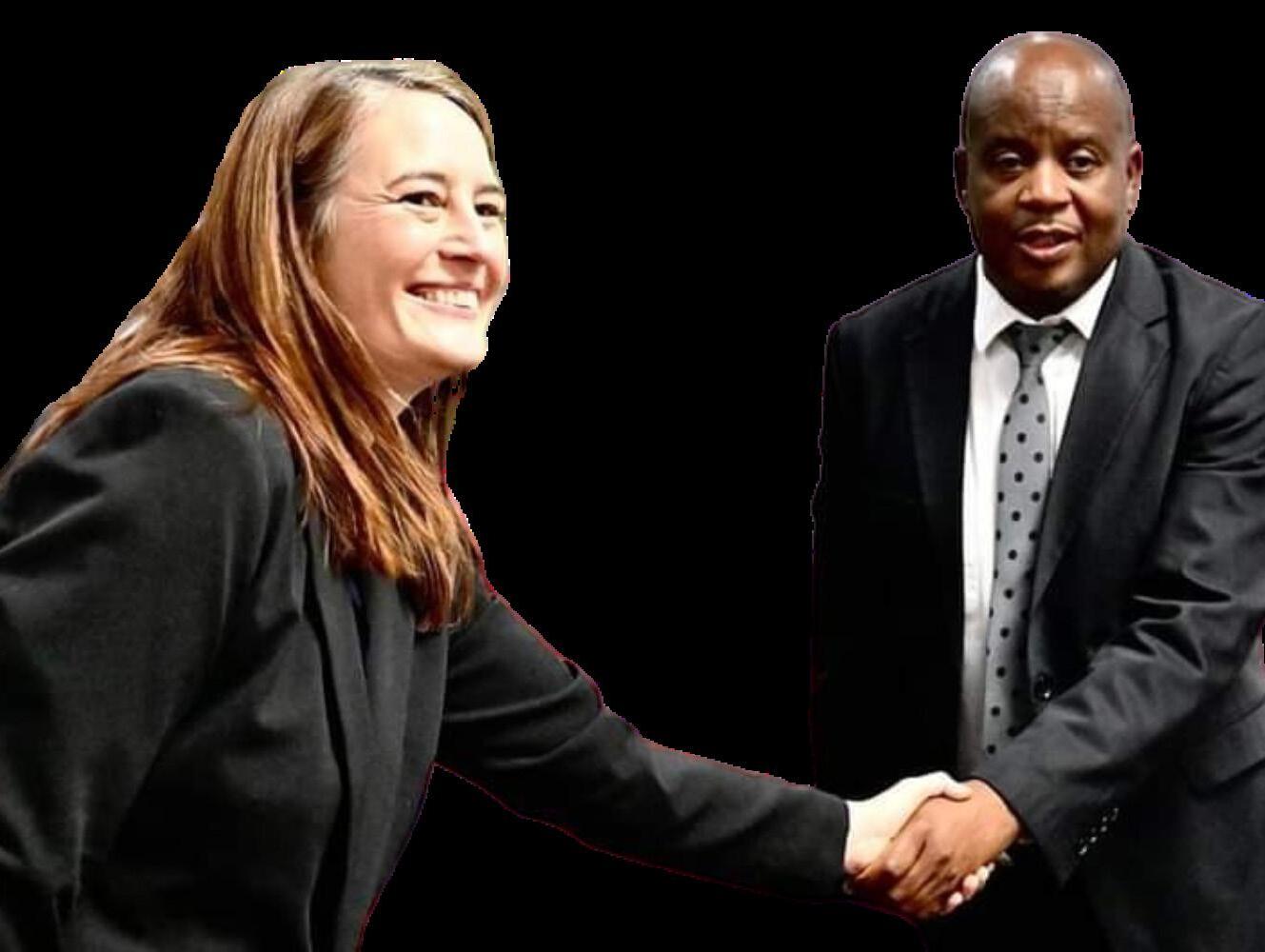


From mining, construction, appliance retail supply, and car dealerships, to her current role as Evotel’s vivacious Senior Accounting Manager, Thandi Mthombeni has journeyed across diverse industries. Now, she believes she’s reached the peak of her career.
The Johannesburg-based workaholic has been named Evotel’s Employee of the Month for August, an honour traditionally bestowed on the “busy bees” who help the business meet its monthly targets.
However, according to Mthombeni, she’s done nothing out of the ordinary—just continued with her daily duties as she’s done throughout her career.
But the ever-watchful team around her saw otherwise, and those with the power to vote decided Mthombeni deserved the coveted recognition.
For the sake of this interview, Mthombeni credits her work ethic for the accolade, noting that she has been observed from afar like a hawk.
“I was voted for,” she says, emphasising that the decision was not made by one person, but by a collective. “This means my work ethic speaks volumes.
It’s now paying off. I used to take a lot of my work home, but not anymore. I don’t take lunch breaks either—I’d rather eat my skhafthini (lunchbox) at my desk. The only real break I take is stepping outside for a few minutes of fresh air. Like I said, I have daily deadlines to meet.”
Mthombeni first encountered Evotel four years ago, after a demoralising retrenchment from a construction company, which was severely impacted by Covid-19, just as many businesses were during those difficult days that disrupted the global economy.
She joined Evotel on 1 December 2020 as an Accounts Payables Coordinator - a month when many people opt for leave - but needing the job, Mthombeni grabbed the opportunity without hesitation.
“I came from a senior position at the construction company, but I accepted the coordinator role because of the experience I had, and as they say, beggars can’t be choosers,” revealed Mthombeni, who has over 15 years of experience in finance.
On her path to success at Evotel, Mthombeni was promoted two years later to Accounts Payables Manager, a role she says was a real eyeopener.
“I worked hard for the promotion, but not by aiming for the position directly—rather by proving to myself that I could handle it,” she says with a smile.
In March 2023, Mthombeni took another leap and was promoted to Senior Accounting Manager, a position she still holds.
The mother of two added: “It’s all about hard work, not positions. I am passionate about my work. If I’m not going to excel at it, I’d rather not do it at all. The Evotel environment motivates me, with a friendly and dedicated team of colleagues. It’s not always easy— every job has its challenges—but we make sure we meet our monthly deadlines.”
Mthombeni credits her line manager, Bradley Fresen, for her success: “He’s been an incredible manager and an inspiration. As a Chartered Accountant (CA), I’m like a sponge around him, absorbing all the knowledge I can, which I hope to use in the future. He’s my biggest mentor.
“For Bradley to compliment us daily means a lot to the team. That’s leadership. It encourages us to wake up every morning and come to work. He often says, ‘You’re doing a great job,’ and little does he know how much that inspires us.
“I’m sure my colleagues would agree—we’ve all learned so much from Bradley. He helps the team understand one another and ensures we meet our deadlines. Every day, we leave the office having learned something new.”
Currently holding a Credit Controller NQF Level 5 certification, Mthombeni plans to return to school in 2025 after postponing her studies in 2024 due to her daughter’s illness:
“My focus in 2024 was on my daughter’s recovery. Now that she’s fully healed, I’m ready to get back to studying.
Next year, things will change for the better.”



Divine intervention saves Levona after being there, done that, and touched by Him.

God works in mysterious ways…
From drug addict to a committed community leader. This is a shortened version of Levona Steenveld’s story.
She’s helped hundreds of people, including dangerous criminals from across the country, dealing with cases ranging from rape, gender-based violence, and murder, to serving as a court representative for all manner of criminal acts.
Hailing from crime-riddled Ennerdale, south of Johannesburg, Steenveld, a former police officer for 16 years, believes she’s been drawn to do all her community work by the Heavens—through divine intervention.
One wonders, from her hectic daily schedule, whether Steenveld has any time for herself, considering the number of social development activities she’s involved
Believe it or not, she’s a true heroine, having recovered from drug addiction, and she’s never shy to talk about it.
With a police background and 13 years of voluntary community work, Steenveld says she’s seen the power of Christ through her, claiming He touched her and pulled her away from the horrible life of addiction.
Now, she enjoys a clean life, she says, and this drives her commitment to assist communities—not just in Johannesburg South, but across the country, including in Cape Town, Durban, and Mpumalanga, all funded by herself.
Each day, she starts with a successful feeding scheme where she donates meals, thanks to Evotel’s financial assistance, along with clothes and other necessities for the community.
“I come from a life of being an alcoholic, a heavy drug addict, and enduring sexual and physical abuse—experiencing all manner of bad things in life,” says the 2024 Heroes Awards nominee in the Community Service category, held at Market Theatre in mid-September.

“Miraculously, I was taken away from that life by a higher power. Believe me when I say there was a voice inside me, telling me to leave everything I was doing, and that it would guide me. I kept arguing and fighting with it, but it said it would carry me through this journey, not just walk beside me.
“It forced me to leave my day job because, even though I wasn’t buying alcohol, I always had something out of nowhere, but the voice kept saying ‘quit’. At the time, my daughter was 10 years old, and I couldn’t afford to quit my job. I tried to negotiate with the voice, asking if I could still use these things, but it said ‘enough’.
“There was a time when I drank a lot of alcohol, smoked cocaine, crystal meth, and weed all at once, but guess what? I wasn’t getting drunk or high. I tried again, but still nothing. That’s when I knew the voice inside me was real and serious. I consulted a Catholic priest, since I come from that denomination, and he said I must trust the voice, because that’s where God lives—inside us. He told me it was a calling.
“Then I started reading the Bible, and God said He would be my provider, but I didn’t know what He wanted from me. Eventually, I gave up my old life, quit my day job, and started fresh. Unlike others, I never had cravings or withdrawal symptoms from either alcohol or drugs—except cigarettes, which I call the devil in me.”
Her daughter is now 23, living in Virginia, USA, where she is studying, and Steenveld attributes this to the power from above.

She knew what God wanted from her when, as soon as she left her old life, she was met with children asking for help—either hungry or in need of counselling and police intervention.
“Then I knew I’m the chosen one, anointed with the power to save Ennerdale,” she declared, adding that she’s never been happier than she is now.
“My daughter needed R70 000 when she got the opportunity to study in America, and I had nothing in my purse, but the money came from nowhere, and her trip happened by the grace of the Lord.”
However, Steenveld faces the trauma of being alone at home, recalling all the horrific incidents she’s witnessed, and how cruel people can be. This touches her deeply and causes her to cry herself to sleep, she reveals.
Asked if she’s ever been a target of angry drug dealers whom she’s exposed?
“They once bombed my house, which is now falling apart because of the impact. They tried shooting me too. I’m only protected by the Almighty. Look, my life is just in God’s hands. I’m at peace with whatever happens.”
But she says the feeding scheme is what makes her happiest, seeing the hungry being fed and the cold being warmed.
Based on her story, the world needs a billion Levona Steenvelds.
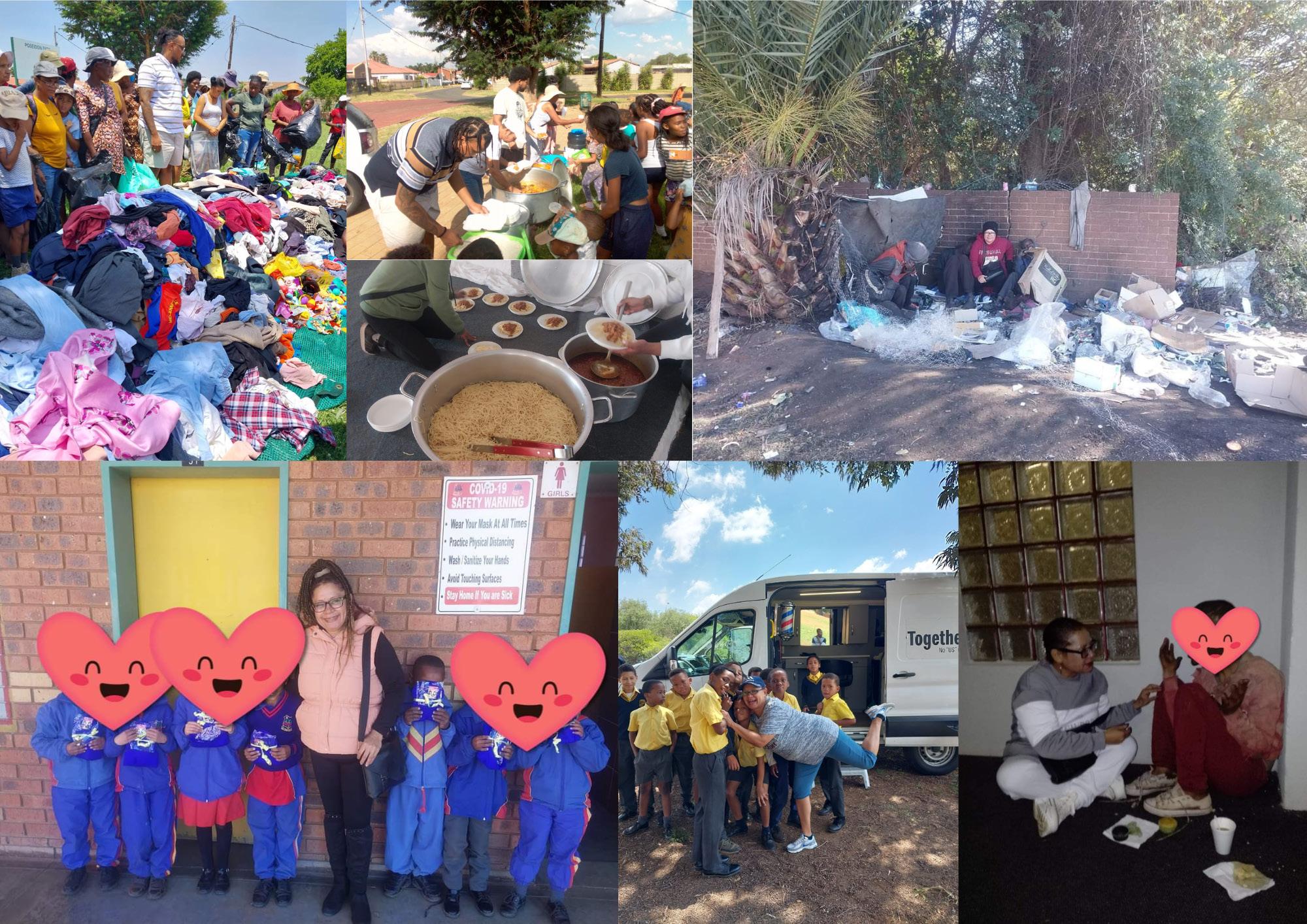
Lower latency means faster response.
Latency is the time delay between when you send a command (like clicking a link) and when you receive a response (the webpage loading).
1
Latency is the time delay
Fibre optic internet has very low latency compared to other types of internet, meaning it reacts faster to your commands.
More devices, same fast speeds
More devices, same fast speeds —even with multiple devices connected, fibre’s low latency helps ensure everyone gets a fast response.


No noticeable delay
No noticeable delay when sending large files or making high-quality video calls on fibre, making it ideal for work-from-home setups.

